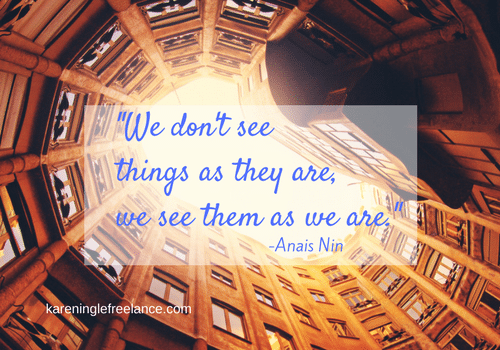Have your friends or your marketing team told you that you need to “tell your story”?
They tell you, “You need to blog.” “You ought to write a book.” “You should start a newsletter.”
You nod and smile, but inside you’re wondering, “Sure. But who would read it? I’m just an ordinary person…”
Can it be you’ve never noticed how your experiences, your perspective, your values, and your voice make you stand out from the crowd?
If so, it’s time to find out.
Ordinary & Unique: perfect pairing
People are looking for role models within reach. Bill yourself as too stellar a celebrity, and you’ll either intimidate them or turn them into clinging groupies. Aim to hear them say, “Hey, you’re a lot like me—only more like I want to be. Tell me how you got there.”
That’s why you want to pair what makes you relatable with what makes you unique.
So consider the following four qualities. Which ones highlight your humanity—that part of you that your readers will resonate with? And which ones spotlight your distinctiveness?
Blog Section Header Text
Your experience
Think of a personal experience that impacted the course of your life. What happened to you that many people empathize with on a deep, visceral level? Did you experience tragic loss, an epiphany about your self-worth, an insult that deeply wounded your childhood heart?
How you built on that experience may be what sets you apart. Did your third grade music teacher’s comparison of your singing to a rhino’s voice drive you to win that Grammy award? Did a mountaineering accident prompt you to team up with a machinist friend to design safer climbing equipment?
Often it’s at the intersection of two experiences—the ordinary and the unusual—where readers are captivated.
If you believe your story resides in your business experience, but can’t quite identify what part of that experience will hook readers’ attention, consider this: Last time you talked shop with new friends, what made them sit up and listen? Was it your habit of innovation? Your knack for making global connections? Your passion for charitable giving? Was it your work habits? Your business model?
In this realm of experience, remember that your “normal” is news to someone who hasn’t lived your life.
Whether you’re writing a memoir, a blog or a business book, your experiences give you a unique message to share. Next, let’s look at how your perspective can make your story stand out.
Your Perspective
No two people watch a football game from exactly the same seat in the stadium.
In the same way, no one has exactly the same perspective on life that you do.
Just try to find one other person with the same place in the family birth order, the same temperament, learning style, geographical location, religion, birthplace, age, AND socioeconomic status. All these influences and more have shaped the lens through which you view life. Can you see why your perspective is as unique as your fingerprint?
And that perspective is what people will miss if you don’t communicate it. Ever noticed how police investigators seek multiple eyewitnesses to get the fullest picture of how a crime went down? In the same way, your perspective brings insight no one else can offer. No one else is standing right where you stand.

You own a particular set of experiences and you see them through your unique lens. But that’s not all that makes you noteworthy.
your Values
One shopper will snap up the bargain item another rejected. In the same way, you also have your own way of assigning value—to objects, events, or ideas.
As an example, your takeaways from a conference will differ from those of the other 300 attendees. Maybe it’s because you view one way of working with clients as more ethical than another. Maybe it was more important to listen to another attendee than to a workshop presenter. Or maybe it’s because your organization is motivated by a different vision and mission.
In other words, you set yourself apart through your values.
And lest you fear that taking a stand for something will be too risky, read this helpful article. In it, Erika Napoletano stresses that your opinion, stated clearly and in keeping with your objectives, will help your like-minded audience find and connect with you.
Opposite-minded readers will turn away. That’s okay. You want to spend your time with the audience you’re here to serve. They will appreciate your singular position.
Finally, we’ll see that how you express that position is your voice.
your voice
Now consider this. Why did actors like Sean Connery, Alan Rickman, and John Wayne make this list of Hollywood’s most recognizable voices?
They sound like themselves, all the time.
You, too, will find that your storytelling uses a distinct combination of tone (humorous, scholarly, blunt), and diction (your preferred word choice). These are the most basic components of your voice. Readers will learn to recognize and gravitate toward that voice of yours.
In addition to those basics, the sound of your voice takes on a timbre shaped by the three qualities above: experience, perspective, and values. You’ll see this as you reflect on the questions posed by Todd Henry, Jerry Jenkins, and Jeff Goins to help you identify your voice. They encourage you to ask yourself questions that range from “What makes me angry (or excited or hopeful or sad)?” to “Is this how I talk?”
are you convinced?
There is an audience waiting to hear from you. I can’t make this any clearer than Todd Henry did:
“We need you. You are not disposable, and your contribution to the rest of us is not discretionary. Do not abdicate your contribution.”
This leads right into my next post, which will help you think through why you should write your story. Then we’ll talk next about how to tell it.
However, if you’re not sure you want to write it yourself, let’s talk.
My favorite thing to do is to listen well, capture your excitement about your message, and then tell your audience your story–as you want it told.
Start working with Karen today
Today could be the day your load gets lighter.
Ask Karen Ingle to make that happen.





